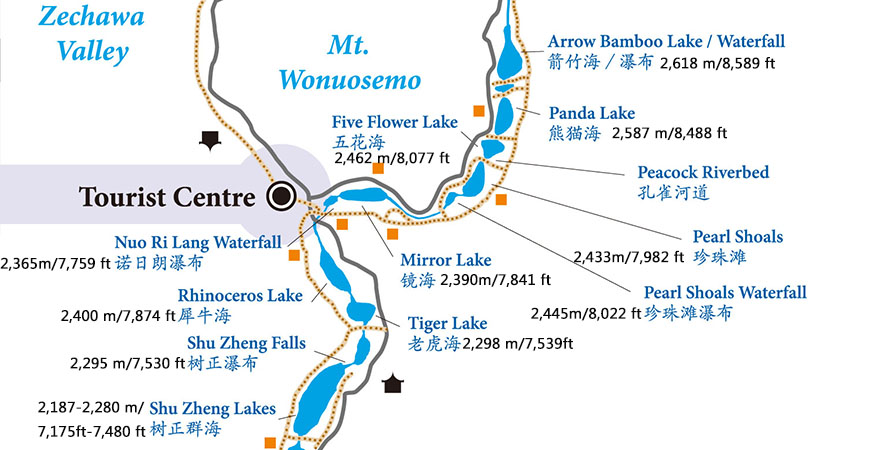
Travel Safety Tips for Jiuzhaigou Valley
General Safety Precautions
Jiuzhaigou Valley is a strictly "no smoking, no open fires" scenic area. In order to protect the ecological environment and for fire safety, all visitors are required to strictly abide by this regulation. Designated smoking areas are available at the Nuorilang Tourist Service Center. Smoking in non-smoking areas will result in a fine of 500 yuan.
Here are some essential safety tips for your trip to Jiuzhaigou Valley:
- No Camping or Unauthorized Stays: For your safety and the preservation of the environment, overnight camping and staying with local families within the valley are strictly prohibited.
- Avoid Hiking Alone: Do not venture into the mountains alone, especially deeper into the valley, to prevent getting lost or encountering unexpected situations.
- Respect Wildlife and Nature: Refrain from activities such as disturbing or feeding fish, picking flowers, chasing wild animals, and littering. Help us maintain the pristine nature of Jiuzhaigou.
- Stay on Designated Paths: For your safety, do not climb trees, rocks, or approach the edges of lakes and cliffs without guardrails, especially for taking pictures.
- Secure Belongings: When getting on or off transportation within the scenic area, ensure you have all your belongings. In case of loss, contact staff or attendants immediately.
Health and Environmental Considerations
- Be Prepared for Varied Weather: Jiuzhaigou experiences significant temperature differences between day and night. The weather can be unpredictable, and the ultraviolet rays are strong. Pack accordingly with warm clothing, rain gear, and sunscreen, but avoid carrying excessively heavy luggage.
- Altitude Considerations: The high altitude of the region may affect some visitors. It's advisable to acclimatize yourself gradually and drink plenty of water. Avoid strenuous activities upon arrival.
Respecting Local Culture
- Respectful Interactions: The Tibetan people of Jiuzhaigou are predominantly followers of the Bon religion, which holds reverence for nature, believing in the sanctity of mountains, rivers, and all living creatures. Please be respectful of their beliefs, customs, and traditions.
- Patience and Courtesy: Jiuzhaigou is a popular destination, especially during peak seasons. Please be patient and understanding in crowded situations, such as during transportation, meal times, and at scenic spots. Let's all strive to be responsible and respectful tourists.
Huanglong Scenic Area: Additional Notes
While visiting the Huanglong Scenic Area, please note the following:
- High Altitude Considerations: Due to the high altitude, the air is thin. Strenuous activity is discouraged to prevent altitude sickness. Consider taking the cable car uphill to conserve energy.
- Acclimatization Tips: To minimize altitude sickness during the drive from Chuanzhusi to Huanglong (about 1 hour), chew gum or eat chocolate. Avoid sleeping during the journey.
- Health Precautions: Individuals with high blood pressure, heart disease, or cardiovascular conditions should consult their doctor before visiting and carry necessary medications.
- Responsible Tourism: Smoking, stepping into water bodies, picking plants, and littering are strictly prohibited. Help preserve this beautiful ecosystem.
Food
The Tibetan people in the region have a unique cuisine.
Don't miss the opportunity to visit a local Tibetan home, savor authentic butter tea, enjoy traditional songs, and perhaps even learn a few steps of the energetic Tibetan circle dance (Guozhuang).
Other Cultural Aspects
This section provides insights into the fascinating cultural aspects of the region:
- Marriage Customs: Learn about the traditional marriage practices of the Tibetan people, which involved courtship rituals and elaborate ceremonies.
- Prayer Flags: Discover the significance of colorful prayer flags that adorn the landscape, symbolizing peace, prosperity, and spiritual aspirations.
- Tibetan and Qiang Cultural Performances: Immerse yourself in the vibrant culture of the region through captivating performances showcasing traditional music, dance, costumes, and storytelling.
- Sky Burial: Gain an understanding of this ancient Tibetan funeral practice, a unique tradition deeply rooted in their spiritual beliefs.
FAQs
Q1: What should I do if I experience altitude sickness in Jiuzhaigou?
A1: If you experience symptoms of altitude sickness (headache, dizziness, nausea), descend to a lower altitude as soon as possible. Rest, drink plenty of fluids, and consider using medication specifically for altitude sickness. If symptoms persist or worsen, seek immediate medical attention.
Q2: Are there English-speaking guides available in Jiuzhaigou?
A2: Yes, English-speaking guides are available for hire in Jiuzhaigou. You can inquire about guide services at the park entrance, visitor centers, or through your hotel or travel agency.
Q3: What is the best time to visit Jiuzhaigou Valley for optimal scenery?
A3: Autumn (mid-September to late October) is widely regarded as the most beautiful time to visit Jiuzhaigou. The foliage explodes in a riot of colors, creating breathtaking landscapes. Spring (April to May) is also a lovely time, with blooming flowers and lush greenery.